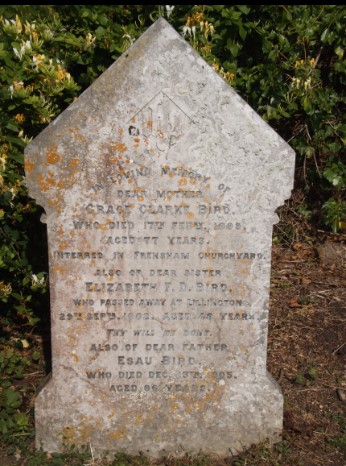Introduction
Esau Bird had a long and active life. The son of a Batcombe farmer, he married into the Dawe family of Melbury Osmond and East Chinnock in 1844. After running a dairy at Hardington, he went on to occupy farms at Batcombe, Podimore, Pendomer and Frensham in Surrey. Toward the end of his life, he lived with his daughter, Mary, who was a beneficiary under the will of his brother, Nathan Bird. Unfortunately, unlike Nathan, who left behind an estate valued at £5,448 at his death, Esau had little to bequeath.
This article also discusses how Natan Bird employed Esau’s unmarried daughter, Mary, to care for his deaf and dumb son and ensured that this care would continue after his death.
Birth
Esau, the sixth child of John and Mary Bird, was born at Batcombe in about 1819.
His father, John, was a farmer who, near the end of his working life, farmed 90 acres at Batcombe and employed four labourers.[1]
Marriage
In 1844, Esau married Grace Clarke Dawe, the daughter of Thomas Bodley and Mary Dawe, at East Chinnock.
Hardington
Esau began his married life as a dairyman at Hardington.[2]
Batcombe
By October 1846, Esau and his family lived at Batcombe, where he farmed for about thirty-five years.
In March 1851, he farmed 80 acres and employed one labourer. By April 1861, he had expanded to 126 acres with three men working for him, and by April 1881, he was farming 400 acres.
Inheritances
In 1852, Grace inherited £5 from her mother.[3]
In 1864, Esau’s father, John, died, leaving an estate valued at “under £300.” He bequeathed £80 to his son, Henry, and gave his son, John, the option to buy his cottage on Leigh Common for £50. He divided the remainder of his estate into seven equal shares, one for each of his children, which resulted in Esau receiving about £30.[4]
Podimore
On 5 March 1880, a 327-acre farm at Batcombe occupied by Esau Bird was advertised as available to let from Lady Day next.[5] Esau was still at Batcombe in April 1881 but left within the next two years as by April 1883, he was a churchwarden at Podimore Milton.[6]
Esau occupied 329 acres at the Higher Farm, Puddimore, until 1888.[7] At the end of his tenure, he held farm sales on 25 September 1888 and 27 November 1888.[8]
Pendomer
Esau then moved to Manor Farm, Pendomer, which he ran with his sons, George and Nathan.
Esau occupied the 290-acre farm for about five years. At the end of his tenure, he held farm sales on 1 March and 9 March 1894.[9]
Frensham, Surrey
After leaving Pendomer, Esau and his family moved to Hillside Farm at Frensham in Surrey, where Grace died from a stroke on 17 February 1899, aged 79.[10]
Esau’s later life
After leaving Pendomer, Esau’s son, George, became the landlord of the Half Moon Inn, West Chinnock, and Esau, along with his daughter Elizabeth, lived with him for a time.
Esau had a wealthy brother, Nathan, a retired farmer who moved to Higher Lillington in the early 1890s.[11] After Nathan’s wife died in March 1900, Esau’s daughter, Elizabeth, lived with Nathan until she died on 29 September 1902.[12]
Nathan Bird died at Higher Lillington on 18 February 1903. He left his niece, Mary Dawe Bird (Esau’s daughter), an annuity of £60 for so long as she looked after his deaf and dumb son, Edmund Arthur, along with £400.[13] Mary began caring for Edmund as a young woman and continued doing so until his death in 1919.
Death
After Nathan’s death, Esau moved to Higher Lillington to live with his daughter, Mary. He died there on 13 December 1905, aged 86.[14]
References
[1] 1851 census.
[2] Hardington baptism register.
[3] The will of Mary Dawe, dated 21 November 1851, proved in London on 8 November 1852.
[4] The will of John Bird of Batcombe, yeoman, dated 11 July 1864, proved at Blandford on 24 September 1864.
[5] Western Gazette, 5 March 1880, p.4.
[6] Western Gazette, 13 April 1883, p.6.
[7] Western Gazette, 4 May 1888 p.4.
[8] Western Gazette, 14 September 1888, p.5; 16 November 1888, p.5.
[9] Western Gazette, 23 February 1894, p.1; Pulman’s Weekly News and Advertiser, 6 March 1894, p.5; Pulman’s Weekly News and Advertiser, 17 April 1894, p.1
[10] Western Gazette, 24 February 1899, p.8.
[11] Western Chronicle, 10 August 1894, p.5; the 1891 census recorded Nathan Bird at Queen Camel.
[12] Western Chronicle, 23 March 1900, p.1; 17 October 1902, p.8.
[13] The will of Nathan Bird, dated 1 February 1892 and codicil dated 7 February 1903, proved in London on 26 March 1903. The codicil increased Mary’s legacy from £200 to £400.
[14] Western Chronicle, 22 December 1905, p.1.



